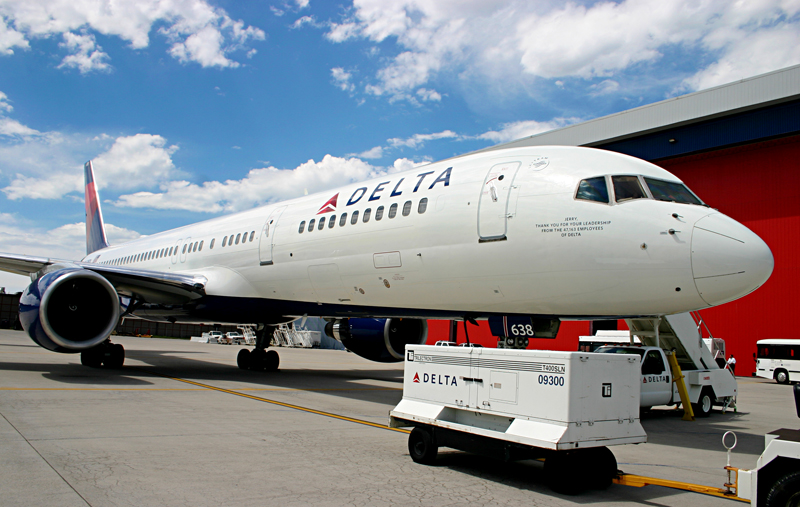“There’s an old saying that should be kept in mind before we get too indignant: you get what you pay for. Flying is too cheap and that’s why it’s miserable. It also means the system is unreliable, less safe and ultimately at odds with the megatrends of our time.”
That Delta Meltdown? It is All Your Fault
Although he already reached the level of being too indignant, Kevin O’Marah — who wrote this article called The Lesson Of The Delta Disaster: Flying Is Too Cheap for Forbes — takes it up another notch with this nugget: “The root problem isn’t bad management, it’s consumers. We’re too ready to choose one flight over another to save a few dollars. In response, airlines have evolved a dynamic pricing system that’s tuned to fill every seat.”
What a great point. Shame on me. The next time I see a fare sale, I will make sure I bypass it and find a more expensive airfare in order to do my part to ensure that what happened at Delta Air Lines earlier this week will never happen again.
In fact, why not apply this interesting — and fatally flawed — theory of economics to other entities? Why should I bother to try to ensure that my money goes as far as it can? If I see a sale at the local grocery store, I will be sure to bypass it — despite the fact that money was paid for someone to come up with the sale in the first place and design and print out fliers to call attention to the sale. Discounts? Ignore them. Coupons? Avoid them like the plague. Loyalty programs? Do we dare even address them?!?
Could the Economy Have Something to Do With It?
“The U.S. economy expanded less than forecast in the second quarter after a weaker start to the year than previously estimated as companies slimmed down inventories and remained wary of investing amid shaky global demand”, according to this article written by Sho Chandra for Bloomberg. “Gross domestic product rose at a 1.2 percent annualized rate after a 0.8 percent advance the prior quarter, Commerce Department figures showed Friday in Washington. The median forecast of economists surveyed by Bloomberg called for a 2.5 percent second-quarter increase.”
Job growth has been better than expected. “The U.S. economy added 255,000 jobs in July and the unemployment rate remained at 4.9%”, according to this article written by Patrick Gillespie for CNN. “It far surpassed expectations of economists surveyed by CNNMoney, who had predicted a gain of 182,000 jobs.” That is wonderful news; but the pace of growth for both jobs and wages are still slower than a year ago…
…and how many of those 255,000 jobs were of the minimum wage or entry level variety? After all, a job is a job — right? The unemployment rate only counts the percentage of people in the total labor force who are unemployed but actively seeking employment and willing to work. It does not count those people who have been out of a job for years and are still unable to find work for a decent wage.
Those are only two examples of a number of sources which report that the economy overall is not doing as well as it should be doing lately. Is that also your fault?
Summary
People can go round for round debating every last bit of financial data pertaining to both the earnings of an airline and the economy in general and twist the numbers in their favor to argue whether or not everything is well. That still does not support the argument that the significant impact suffered by the systemwide operations at Delta Air Lines earlier this week is the fault of its customers — which is at best a myopic viewpoint.
With all due respect to Kevin O’Marah, it is not the fault of the customer that airlines offer low airfares. When airlines offer lower airfares, more people will usually purchase them. The customer does not put the proverbial gun to the heads of executives to arrive at decisions which can be considered questionable at best pertaining to the financial operations of an airline…
…and had he missed the fact that — despite lower airfares — the airlines have been raking in record profits in recent consecutive quarters to the tune of billions of dollars? Blame that on customers who choose to pay ancillary fees for products and services which used to be bundled in the airfare.
There are elitists who believe that travel should only be for those who can truly afford it and that those who do not earn enough of an income to travel — well — tough luck. Explain then why is there such a proliferation of weblogs flooding the Internet and purporting that travel is either free or ridiculously cheap — other than for those who are wealthy but are still looking to beat the system?
I am not suggesting that people should spend money on items and services which they cannot afford — including travel — as that would be the epitome of financial irresponsibility (cough — affiliate credit cards — cough cough); but if an airline offers airfares for as low as $15.00, is it the responsibility of the person to say, “Well, I do not want for the airline to suffer a technology meltdown or a significant impact on its systemwide operations in the future. Despite wanting to travel with the kids to see Aunt Grandma for the first time in years, I must respectfully decline patronizing the airline at those low airfares that it is offering.”
Yeah — right.
By the way, Delta Air Lines politely declined to comment on the article written by Kevin O’Marah.
Photograph ©2007 by Brian Cohen.

